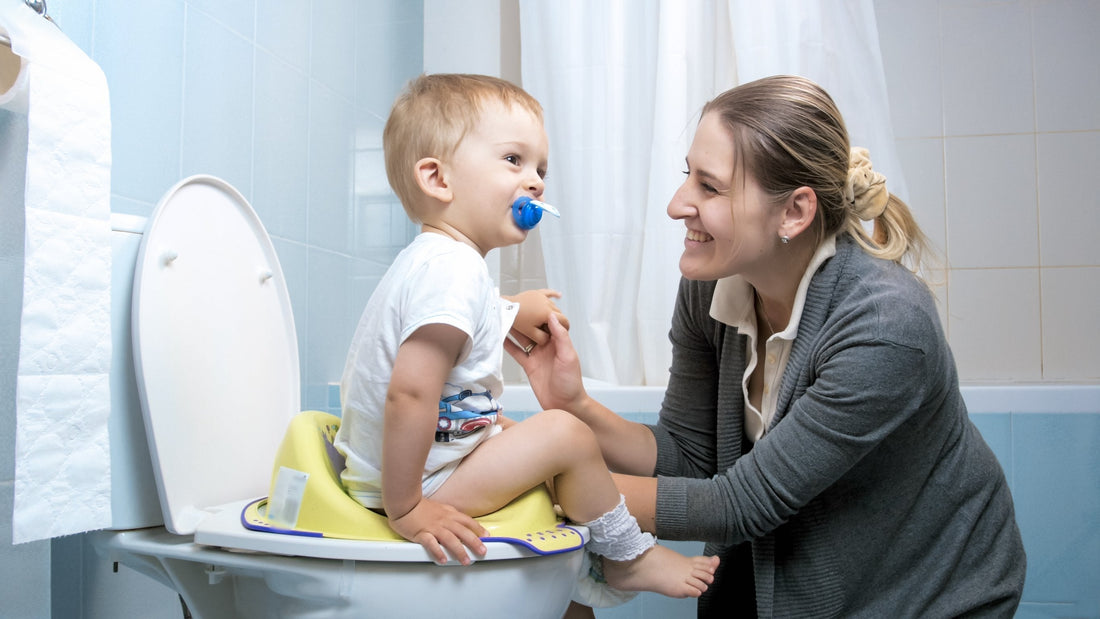Potty Training & Sleep: Your Complete Guide
| updated:Share

Even when little ones stay dry during the day, bedtime potty training often presents a whole new challenge. If you're struggling to drop the nighttime diapers with limited success, this comprehensive guide can give you and your toddler the confidence to conquer potty training around the clock.
Potty Training Your Child Successfully
The main thing to know about potty training, particularly at night? It won't work until your child is ready. Cues that kids can handle the transition include the ability to follow basic directions and the physical agility to make it onto the toilet in time. They should also stay dry for at least two hours during the day before you start the process.
Stay patient and put off nighttime potty training until they show appropriate developmental signs, such as waking up dry on some mornings. Younger toddlers often don't have the necessary bladder control yet. Your child should also be in a bed instead of a crib just in case they have to get up to go to the bathroom.
Potty Training Before Bedtime
Establishing a solid bathroom routine during the day can help ease the nighttime potty training process. Before your child gets with the program, ask if they need to go to the bathroom every 30 minutes or so during the day. After a while, your toddler will begin to recognize the body's cues and respond right away, which facilitates overnight training.
Make sure your child uses the bathroom at least once within 30 minutes before bedtime. Some parents even wake up little ones for one last toilet trip around midnight, which could work if you tend to stay up late.

How Proper Potty Training Can Help Your Child's Sleep
You might find that potty training disrupts your child's sleep since you'll be prioritizing trips to the bathroom over naps and bedtime during the first week or two. Over time, however, a regular bathroom routine will go hand in hand with a healthy sleep schedule. Your kiddo will learn to stay asleep as better bladder control develops, further improving the quantity and quality of evening rest.
What To Do When Your Child Has An Accident
Remember that some older children don't have the bladder control to hold their urine for 10 to 12 hours at night. While you should always consult your pediatrician about anything out of the ordinary, bedwetting can be normal until around age 7. Using a pull-up at night is the best course of action when your child still frequently wets the bed. Otherwise, you may find yourself changing the sheets in the middle of the night much more often than you'd prefer. You can also try sheet protectors until your toddler gets the hang of the new routine.
4.9 /
5.0
(8)
8
total reviews
Sleepy Time Spray
Sale price
$12.99
Guiding Your Child If They're Anxious Or Reluctant
Instead of stressing over the nighttime potty training process, focus on celebrating when your child manages to stay dry overnight. Providing lots of positive reinforcement can ease some of your little one's anxiety about this big transition. If you outwardly worry about potty training, it can add pressure that could compound the problem. Special underwear with favorite characters and cool stickers are two fun ways to reward your child for a dry morning.
While potty training puts a lot of pressure on parents and toddlers alike, the process can be painless if you put it in perspective. It can take about six months for kids to stay dry overnight, even after successfully doing so all day. Follow your child's lead, and you'll soon find those late-night wake-ups are a thing of the past.
Sources:
https://www.healthychildren.org/English/ages-stages/toddler/toilet-training/Pages/The-Right-Age-to-Toilet-Train.aspx
https://www.hopkinsmedicine.org/health/wellness-and-prevention/toilettraining
https://www.healthychildren.org/English/ages-stages/toddler/toilet-training/Pages/Praise-and-Reward-Your-Childs-Success.aspx
https://www.healthychildren.org/English/ages-stages/toddler/toilet-training/Pages/Bedwetting.aspx
https://www.healthychildren.org/English/ages-stages/toddler/toilet-training/Pages/Stages-of-Toilet-Training-Different-Skills-Different-Schedules.aspx



